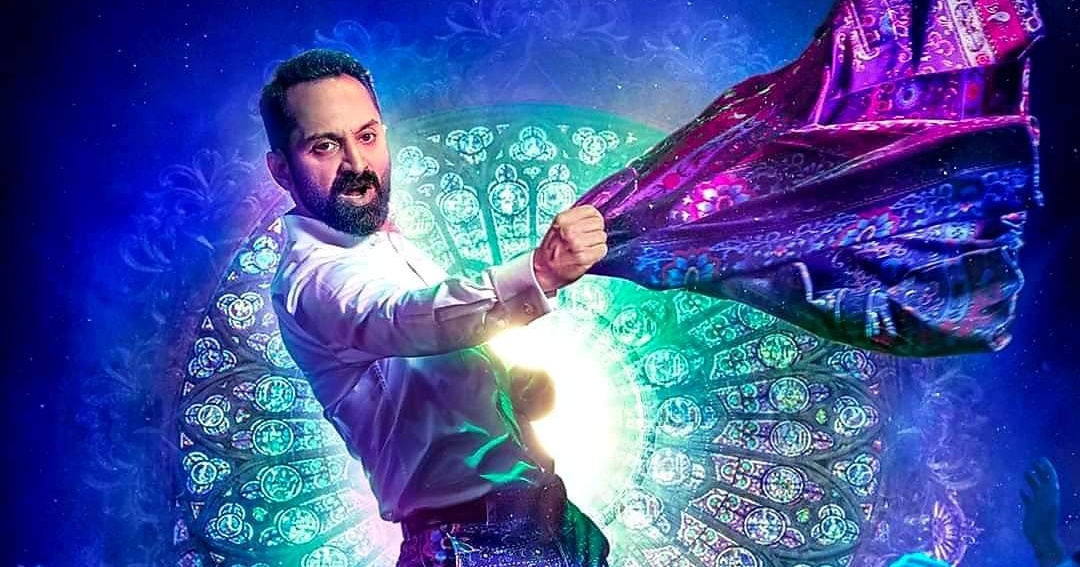
Anwar Rasheed is back after a hiatus of seven years. His bold, immersive style of filmmaking is original to an extent that it completely justifies the hype around his latest release Trance. As I planted myself in a cinema to experience his newest labour of love, flashes of his celebrated oeuvre blinked within – the warm, personal scent of sulaimani in Ustad Hotel, the heart-breaking revelation in Aami, the sense of deep dejection that Bridge brought along and the zany, spontaneous wit that made Chhota Mumbai a mega hoot.
As if to quench my thirst, Trance opened in classic Anwar Rasheed fashion. It is about Viju Prasad (Fahadh Faasil) who wants to make a career out of motivational speaking. He is ambitious and also quite brazen when it comes to landing a big sale. Somewhere there, we equate his dream to be on the lines of an influential TedX speaker. Sadly, Trance breeds no such noble desires. Way early in the film, we observe Viju’s beachside home. The stairway begins with an unobvious quote that signals why succeeding is a big deal for Viju. There is also a washed out painting of Mother Teresa – a visual so fleeting that it disappears before you could connect the dots. Viju inhabits the space with his mentally unstable brother Kunjon (a brilliant Sreenath Bhasi). Theirs is a subplot that is heart-wrenching but is also devious and tell-tale if we look at it as an opportunity to navigate the screenplay further. It also exists so as to set a mild tone of sympathy to Viju’s journey which is about to ensue. Amal Neerad picturizes the passage with a nuanced coating of melancholy. You feel the surge of sea waves through the house’s windows. The abandonment, the embitterment – each of it is crystal clear in the stylish melange of past and present.
The chapter ends with Viju’s action of hiding sharp objects from Kunjon – something that he repeats later with another character, one with lesser finesse and a narrower arc. Ditto for the angle involving letters that both characters pen for Viju. It works like magic, having seen through Anwar Rasheed’s lens which brings out guilt with remarkable beauty. Marginally compromised writing aside, this brief yet marvellously composed segment sets tone to what lies ahead in the loud, psychedelic and deeply disturbing Trance.
ALSO READ: ‘Kumbalangi Nights’ review – a sharply observed film that marks a sublime directorial debut
Soon after a significant twist, Viju takes off to Mumbai – perhaps to find a method to deal with his recurring nightmares. There he stumbles upon two eerie business magnates, Solomon (Gautham Menon) and Isaac (Chemban Jose), who propose an idea to convert his oratory skills to a money-minting proposition. The extra additive here is the drug called religion – which is more powerful, more trance-inducing than any hallucinogen, the film tells us.
Trance spends the remaining acts to dissect the rise and rise of the street-smart Viju to become the suave, self-styled pastor (they seldom call him a Godman) Joshua Carlton alias JC. He forms a massive cult which steadfastly subscribes to his miracle working ways. It is disconcerting as well as eye-opening to witness his exponential growth – from penury to the pinnacle of affluence – all under the tutelage of Avarachan (Dileesh Pothan) besides the silent pioneering forces, Solomon and Isaac. The film takes a predictable turn when the pastor is invited for a live interview on a ‘secular’ television channel hosted by a John Brittas-styled intrusive anchor, Mathew (Soubin Shahir).
The first half of Trance, in ideal terms, is populist. It moves at a brisk pace. There are profound contours in the story which changes textures, every few minutes. We get new characters and newer incidents in quick intervals. I must say, it is exceedingly satisfying when combined with Anwar Rasheed’s edgy storytelling style. I could nearly sense the thrill of reading an incessantly captivating thriller novel that would keep me on the edge of my seat. The writing itself is so visual that I didn’t need Amal Neerad’s frames to add an extra layer of daze. The screenplay is wholesome and every character emanates a definitive vibe – of empathy, eccentricity, intrigue or plain turpitude.
Enter the third act and Trance trips on what I dare call the curse of the second half. For a screenplay that glided smoothly thus far, the film comes to a sudden halt in terms of variety. Newer characters and subplots emerge but with lesser accountability to the film. There are passages – such as the one where JC challenges and Solomon and Isaac – which are powerful individually but easily belongs to a different mood and space. The sound and fury remain the same but this time around, we feel the decibel levels surging.
After a point in Trance, the chief antagonists begin to appear as mere elements making angry faces. If we look closely, they do not lack intellect. The pattern that they want to instil in JC’s brain by denting his mental state with hallucinatory drugs may look like a done-to-death trope but it does elicit genuine fear. It is just that the menace remains detached, at all points. Solomon and Isaac could well have been a single character. They appear to display exaggerated mannerisms and assert the very same point to a grimaced, violated Viju.
ALSO READ: Varathan Review – a moody film that eventually drowns in a simplistic finale
The character that works better is Dileesh Pothan’s wonderfully performed Avarachan. The shades in his character are so ambiguous that we doubt if he will ever change textures – from being unscrupulously evil to maybe empathising a little with Viju. Avaracahan is a powerful mentor and a rousing cheerleader. However, the character, much like the film in unison, meets a highly unimpressive end.
Talking about character arcs, I doubt if the writer (Vincent Vadakkan) ever intended to delve deeper into any of his protagonists’ mindspace beyond what we see on screen. Barring Viju, Kunjon and, to a small extent, Avarachan, the people who inhabit Trance have unconvincing individual trajectories. Nazriya’s Esther is fascinating in isolation but her presence adds no meat to the plot besides becoming a catalyst to what the writer thinks is clever, but isn’t. That said, I loved the way she approaches the tricky part with pizzazz and her ultra-stylish introductory scene is one to die for. There is also Thomas (Vinayakan), a devotee who emerges out of nowhere. The actor puts his best foot forward but the subplot refuses to knit well to the film’s texture. His final scenes (one with JC and another with Solomon and Isaac) are silly and baffling.
Another feeble element in the screenplay is Soubin’s Mathew whose characterisation somersaults in the final act. While one cannot question the twists involved, the writing here is so devious that it becomes hard to take the film seriously at that crucial dramatic juncture.
That said, none of the aforementioned writing incongruences prevent Trance from become a massive visual, acoustic treat. Jackson Vijayan and Sushin Shyam’s original score induces an ambience so terrific that it is impossible to not turn into an active participant in the proceedings. Cementing the aural effect further is the sound design which delivers the spook and enigma of cult groups with fantastic flair. Amal Neerad’s cinematography is consistently arresting and, for once, I loved his indulgent bits. Flourishing with some stylishly edited long-takes and montages, the DOP works wonders – be it with the extreme close-ups, zooms or circular pans capturing the atmosphere to the T.
If technical brilliance is one aspect that places Trance on a higher citadel, it is Fahadh Faasil’s unbelievable lead act which fortifies its impact. An acting virtuoso of high order, Fahadh lives within the skin of a desperate and gullible Viju who turns into a magnetic messiah with a million followers. It takes guts and enormous acting talent to pull off a part which demands a gamut of expressions, a definite need for agility and is also one with a solid evolutionary arc. Clearly, this is one massively effective central act which helps us forgive the film’s occasional inconsistencies.
That aside, Trance, at every point of its 170-minute long run-time is a masterful showcase of Anwar Rasheed’s widely admired directorial skills. The emotional moments possess solid heft that can shred our hearts into pieces. Even the most hastily penned sequences are accentuated with a cinematic heaviness that only a director of calibre could have achieved. I was particularly amazed with the way he builds tension on screen. Fahadh Faasil is truly a sight to behold as he dexterously makes use of his body in terms of posturing and gestures as he sat fiercely opposite a difficult interviewer. For sure, it was not an actor’s singular proficiency at work. It was the doing of a filmmaker on a passionate trip – sometimes psychological, sometimes political or otherwise achingly real. You wouldn’t even realize the verve which passes on like electricity and consumes you slowly, unless it’s all over.

